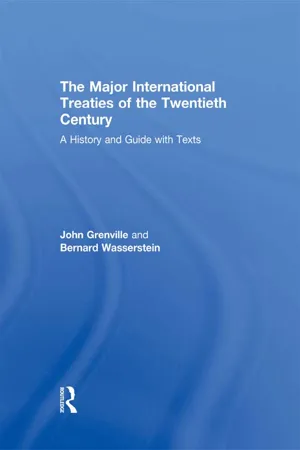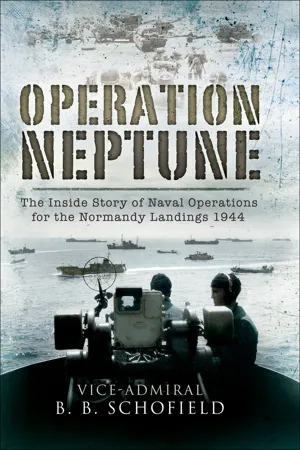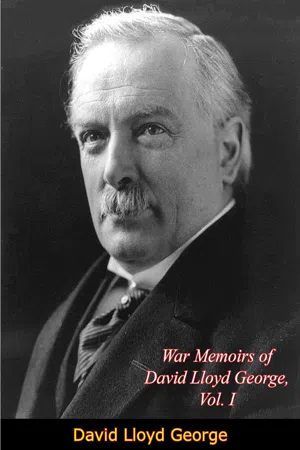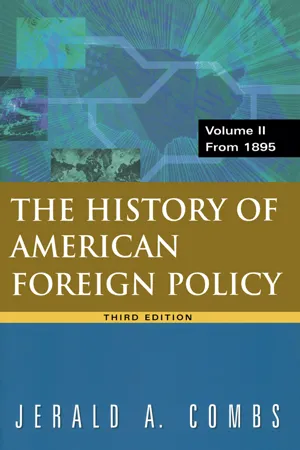Casablanca Conference
The Casablanca Conference was a meeting held in Casablanca, Morocco in January 1943 during World War II. It was attended by the leaders of the Allied powers, including Winston Churchill and Franklin D. Roosevelt. The conference focused on the next steps in the war effort, particularly the invasion of Sicily and the unconditional surrender of the Axis powers.
5 Key excerpts on "Casablanca Conference"
- eBook - ePub
I Was There: The Personal Story of the Chief of Staff to Presidents Roosevelt and Truman
Based on His Notes and Diaries Made at the Time
- Fleet Adm. William D. Leahy(Author)
- 2017(Publication Date)
- Arcole Publishing(Publisher)
...11—CASABLANCA AND WASHINGTON CONFERENCES; DISTRESS SIGNALS FROM CHINA The year 1943 was a year of conferences. President Roosevelt and Prime Minister Churchill and their senior military advisers met no less than five times. These war councils were: Casablanca (January 14–26); Washington (May 11–25), which had the code name of TRIDENT; Quebec, Canada (August 11–24), which was called QUADRANT; Cairo, which was attended by Generalissimo Chiang Kai-shek and his staff (November 22–26); and Teheran (November 27–December 2), which for the first time during the war brought together the leaders of the three great powers. In the closing week of 1942 the necessary adjustments were made in North Africa, following the assassination of Admiral Darlan. On Christmas afternoon, after conferring with the President, I sent three cable-grams for him. The first was to delay the visit of General de Gaulle to America, the second authorized General Eisenhower to appoint General Henri H. Giraud in charge of French civil and military affairs in North Africa, and the third conveyed Roosevelt’s condolence to Mme. Darlan and suggested that she bring her son to Warm Springs, Georgia. The French Mission in Washington on December 29, through General Émile Béthouart and Jacques Lemaigre-Dubreuil, urged on me that French troops in North Africa be given a priority over our own forces in the matter of military equipment. This attitude was extremely disconcerting in view of the fact that there was not a sufficient number of American troops in Africa to hold the French under control in that great area by force of arms. Also on December 29, in a talk I had with Secretary of State Hull, Hopkins, and General Marshall, the Tennessee diplomat lamented that he expected another press attack in the near future by what he called the de Gaulle “Polecats.” The entire North African situation was reviewed in detail when the Joint Chiefs met with the President on January 5, on the eve of our departure for Casablanca...
- eBook - ePub
The Major International Treaties of the Twentieth Century
A History and Guide with Texts
- John Grenville, Bernard Wasserstein, John Grenville, Bernard Wasserstein(Authors)
- 2013(Publication Date)
- Routledge(Publisher)
...From a political point of view the Conference of Casablanca (Churchill, Roosevelt, Combined Chiefs of Staff) 14–25 January 1943 was notable for the attempt made to bring together Generals Giraud and de Gaulle; also for the ‘unconditional surrender’ call as the only terms the Allies would offer their enemies. The phrase ‘unconditional surrender’ had been under discussion, but was omitted from the final communiqué, though publicly announced in a press conference given by President Roosevelt. Research which was to lead to the making of the atomic bomb was the subject of a secret Anglo-American agreement at the Quebec Conference of August 1943, not disclosed until 1954. The exclusive possession of the bomb with its secrets, and the unknown possible application of atomic energy after the war, made the knowledge of the secrets one of the most prized assets of power in the war and in the post-war world. These secrets were not shared with the Soviet Union. The Agreement on Anglo-American–Canadian collaboration and development of atomic research was signed on 19 August 1943 by Churchill and Roosevelt. It set out the policy of pooling in the United States the scientists and resources to speed the project. The two countries undertook not to use the atomic bomb against each other; they also agreed not to use it against another country without each others’ consent; they agreed not to communicate any information to another country without their mutual consent. Britain disclaimed any ‘post-war advantages of an industrial or commercial character’ beyond what the president of the United States considered fair and just and for the welfare of the world. Allocation of materials, all policy, and interchange of information was to be the function of a Combined Policy Committee of the three American, two British and one Canadian officials. Information about large-scale plants was to become the subject of later agreements...
- eBook - ePub
Operation Neptune
The Inside Story of Naval Operations for the Normandy Landings 1944
- B.B. Schofield(Author)
- 2008(Publication Date)
- Pen & Sword Maritime(Publisher)
...Ramsay was appointed as his Deputy, a decision he loyally accepted though naturally with some disappointment. The operation was launched on the night of November 7/8, 1942, and was an unqualified success, the Germans being taken completely by surprise. A German staff appreciation dated November 4, 1942, stated, “The relatively small number of landing craft and the fact that only two passenger ships are in this assembly at Gibraltar do not indicate any immediate landing in the Mediterranean area or on the North West African coast.” 4 Many lessons were learnt from Torch and one which was to have a great bearing on future amphibious operations was the need for a very high standard of training on the part of the beach parties, without which chaos can quickly occur. THE Casablanca Conference During the time the campaign to evict the Axis forces from North Africa was in progress, a conference took place at Casablanca in January 1943, at which the President of the United States and his advisers conferred with the Prime Minister and his advisers with regard to the future conduct of the war. The author was privileged to attend this conference, during which several major decisions were taken, one of the most important being that plans for a reentry into Europe must be initiated without further delay, and the concentration of forces and material in Britain resumed. Lieutenant-General F.E. Morgan was selected as Chief of Staff to the Supreme Allied Commander (Designate), a title which he soon shortened to COSSAC and by which he is subsequently referred to. In his book Overture to Overlord he has told, with admirable clarity and wit, how he was instructed to start planning for the invasion of Europe, known as Operation Overlord...
- eBook - ePub
- David Lloyd George(Author)
- 2017(Publication Date)
- Arcole Publishing(Publisher)
...CHAPTER XLVII—THE ROME CONFERENCE WHEN the Anglo-French Conference met in London on 26 th December, 1916, to discuss the terms of the Allied reply to the German and Wilson Peace Notes, I proposed to it that representatives of the Governments and of the High Military Commands of Britain, France and Italy should meet together in conference at an early date, in order to have a frank discussion on the whole military and political situation. There were immediate decisions of great urgency to be taken as to the Balkans, and to suit the convenience of General Sarrail, the Commander-in-Chief of the Allied Forces at Salonika, General Milne, the British Commander, and also the Generals in command of the Serbian and Venizelist forces, whose presence at the discussion of the Greek position was desired, it was ultimately arranged that the conference should be held in Rome. The Rome Conference met on 5 th, 6 th and 7 th January, 1917. I took with me Lord Milner, Sir William Robertson and Sir Maurice Hankey. The French Premier, M. Briand, was accompanied by MM. Albert Thomas and Berthelot, and General Lyautey, the new French War Minister. The principal Italian Ministers were present in full force with the Commander-in-Chief, General Cadorna, General Sarrail and General Milne, who commanded our Army in the Balkans, crossed over from Salonika. Sir Francis Elliott and Colonel Fairholme, the Military Attaché, came from Athens. In order to define the aims, and, in so far as I could, direct the discussions of the Conference, I had prepared the following memorandum which I circulated to the delegates. It was designed definitely to raise the important issues as to Allied strategy which I have set forth in the preceding chapter, and if possible to obtain decisions which would release us from the fatal net in which we were enmeshed by the Chantilly plans. “1...
- eBook - ePub
- Jerald A Combs(Author)
- 2017(Publication Date)
- Routledge(Publisher)
...Knowing Stalin would object, Roosevelt and Churchill put off notifying him officially of the deferral until much later in 1943. In the hope of sweetening the bitter pill and counteracting the squalid aftermath of the Darlan deal, Roosevelt announced at the end of the Casablanca Conference that the Allies would demand unconditional surrender of the Axis powers. Unconditional surrender would reinforce the decision to postpone territorial arrangements until after the war by reassuring Stalin that his allies would not make a separate peace. Unconditional surrender also implied the total destruction of German power to avoid what was thought to have been a mistake at the time of World War I. The Russians would not need to fear future invasions from a weakened Germany, so Roosevelt hoped that Stalin might abandon his demands for a rigid security sphere in Eastern Europe. After the Casablanca Conference, dissension increased among the Allies over the second front strategy. Churchill feared that the Americans wanted to divert supplies and troops to the Pacific theater. The Americans tried to limit the Mediterranean operation in favor of building and planning the 1944 cross-channel invasion. Stalin kept up a running denunciation of the ineffective efforts of both his allies to relieve the Russian front. Meanwhile, the Allied invasion of Sicily and Italy quickly forced Italy’s surrender, causing further Allied dissension. Great Britain wanted to deal with the Italian king and Marshal Pietro Badoglio, whom the British believed were best able to keep Italy from falling apart. Roosevelt preferred to replace these Fascist collaborators with a more centrist government headed by Count Carlo Sforza. Stalin complained that the Russians were being ignored entirely in arranging the surrender...




